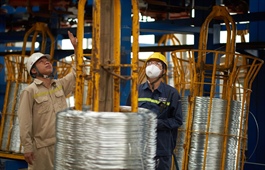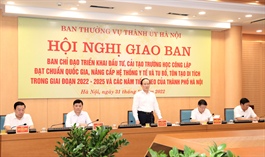Ho Chi Minh City to set development precedent
Ho Chi Minh City to set development precedent
A firm determination was palpable in recent working sessions between leaders of Ho Chi Minh City, senior leaders of the Party, and ministers of various central ministries to pilot new and innovative policies for Ho Chi Minh City that would serve as precedent for future replication across the country.
Illustrative photo. |
Pioneering moves
At a meeting with Mr. Trần Hồng Hà, Minister of Natural Resources and Environment, Mr. Nguyễn Văn Nên, Secretary of the Ho Chi Minh City Party Committee, said that in coming time Ho Chi Minh City will focus on doing new works rather than what are already existing. Ho Chi Minh City is ready to host a series of pilot projects to serve as precedents. Proposals and recommendations on the amended Law on Land will take effect by 2024 once they are approved. However, Ho Chi Minh City must not wait until 2024, but must actively find ways to perfect its functioning and legal system.
Mr. Trần Hồng Hà also said that many mechanisms and policies on land and environment that Ho Chi Minh City proposed as pilot are correct and have a valid basis. Mr. Hà confirmed that out of 18 problems, 16 were included in this amended draft Law on Land by the Ministry of Natural Resources and Environment. He asked the city to assign a focal point to prepare documents, summarize and complete the project to submit to the Government for submission to the National Assembly for consideration and approval.
Future expectations
On 7 October, the Politburo issued Resolution 24 on socio-economic development to ensure national defense and security in the Southeast region until 2030, with a vision up till 2045. This Resolution will continue to affirm the region's strategic position and particular important role. The Politburo especially emphasized the need for stronger, dynamic, and creative innovation, to make breakthrough changes in continuing to build and develop the Southeast region into a center of economy, finance, commerce, education, high-quality human resources, science and technology, innovation, and digital transformation. The Southeast region will play a leading role in regional and national development.
Ho Chi Minh City is planned as an important economic hub, an international financial center, a destination for the middle class and young intellectuals, and a vibrant place to live and work. The city has a development plan on par with many other major cities in Asia and plays a vital role in the growth of the Southeast region and the entire country.
Resolution 54/2017/QH14 will support pilot programs on specific mechanisms and policies for the development of Ho Chi Minh City which after five years of implementation will bring outstanding results. Accordingly, the implementation of Group A projects will be faster and the increase in capital mobilization limit will allow the city to actively issue local government bonds, borrow from domestic financial institutions, other domestic organizations, and from Government's foreign loans, to provide resources for development spending.
Ten main pilot tasks
First, formulate and promulgate the land price adjustment coefficient suitable to the actual situation of the city and submit it to the City Council for approval. On that basis, the People's Committee of Ho Chi Minh City will promulgate the price adjustment for calculation of land use levy and land rent for all land plots, regardless of the value calculated according to the land price list. Second, the compensation shall be made by allocating land with the same use purpose as the recovered land. If there is no land with the same use purpose, compensation is made with land with a different use purpose than the type of land acquired by percentage. Assign the City People's Committee to summarize the reality and decide this percentage in accordance with the actual situation in the locality.
Third, separate compensation, support, resettlement, and site clearance into independent public investment projects for Group B projects in the locality. Fourth, reorganize the Compensation and Site Clearance Committee of Thu Duc City into Thu Duc City Land Fund Development Center under Thu Duc City, performing the same functions as the Provincial Land Fund Development Center.
Fifth, separate the plan for allocation and zoning of city land for the period 2021 to 2030, with a vision to 2050 for independent implementation. Once completed, it will be integrated into the general planning of Ho Chi Minh City. Sixth, the city does not approve the annual district-level land use plan. Seventh, land-use organizations may mortgage, lease, and transfer the right to rent land with annual payments. Eighth, apply a basis for land allocation or land lease in a written approval of an auction winning results, the bidding of the competent State agency, and the approval of the payment policy for BT projects.
Ninth, procedures for land lease or land lease with water surface must comply with the provisions of the Law on Land, and to carry out the procedures for leasing the sea area in accordance with the current Law on the Sea of Vietnam and the Law on natural resources and environment of sea and islands for seaport projects, including sea encroachment projects.
Tenth, permit the Land Fund Development Center to carry out short-term exploitation of the land areas managed by the Land Fund Development Center, but which have not yet had a decision on land allocation or land lease. Assign the People's Committee of Ho Chi Minh City to issue detailed regulations on short-term exploitation of the land fund managed by the Land Fund Development Center but have not yet made a decision on land allocation, land lease, and allocation of at least 10% of the revenue from this work to the Center for Land Fund Development.
Regarding the content of decentralization, the People's Committee of Ho Chi Minh City is entitled to determine the land price for compensation and support for the People's Committee of districts to implement.























